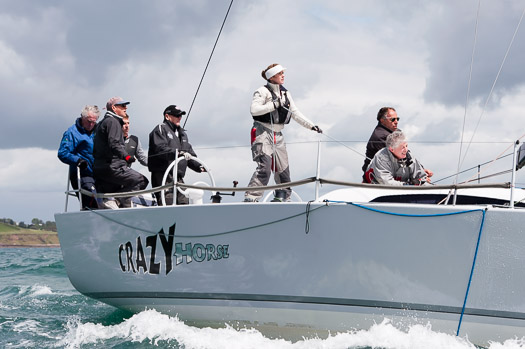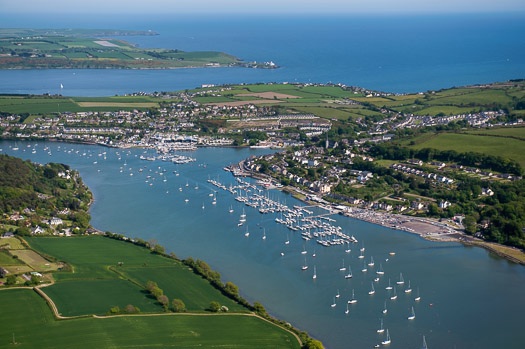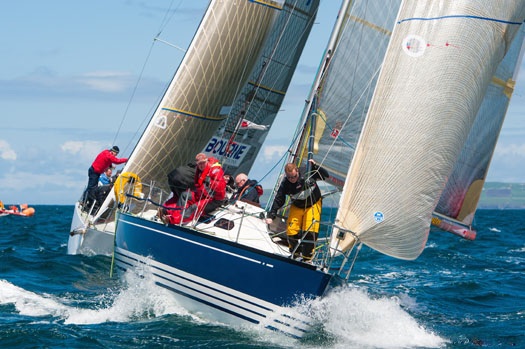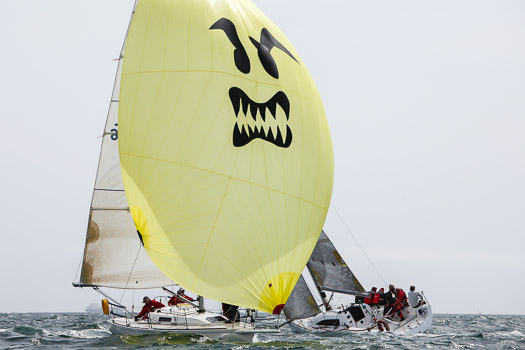#cruiserracing – As we start to emerge from seven years of recession, we find the world of sailing has undergone changes which may have not been noticed in the struggle for economic survival. To prosper today, it seems that sailing must hope to be family friendly, and accessible to spectators and would-be participants alike. W M Nixon reflects on how this is working out in the macho world of cruiser racing.
The ICRA Nationals 2015 will be combined with next year's biennial Sovereigns Cup in Kinsale in order to make the event more user-friendly, and comfortably exceed the required critical mass in terms of numbers participating. It is an utterly logical development. And it's scarcely sensational breaking news, as the dogs in the street have been aware of it for a while now, even if an official announcement has yet been made.
But for those who were rather taken by the original notion of the Irish Cruiser-Racing Association staging an annual stand-alone national championship event, rotated around maybe as many as half a dozen centres, this may seem like a retrograde step from the high-flown idealism of the founders. And their vision certainly worked when the streets were awash with money, and people continued to subscribe to the notion that it was acceptable for offshore racing types to devote virtually all their free time to their rather expensive sport, regardless of how anti-social it seemed to family and friends (if they had any of either).
Now, however, the money's gone, and if anything its absence has accelerated the move towards shared recreation. Whatever rugged traditional amateur offshore racing may have been in its heyday, it scarcely qualified as shared recreation. Its austere joys were confined to the direct participants, while the outcome of each contest was an arcane matter to be teased out and analysed only by a very small number of aficionados.
Yet the boats it developed proved popular, with one of the by-products being the acceptance and development of cruisers which sailed well and could, if wished, be realistically raced. In fact, in Ireland in particular, many of these boats with lids are never cruised at all, and no-one ever even overnights aboard them. So after you've had yet another samey day sail round the same familiar old bay, the idea of a spot of racing has appeal.
A boat regularly raced with a modicum of enthusiasm and skill will attract regular crewmembers who want to be sure of getting their fix of sailing once or twice a week, but who also have other things to do – they've other sports, hobbies and interests to take up the rest of their time in addition to the increasing demands of family and social expectations.

Steady steering afloat, and flexible management ashore....Nobby Reilly of Howth, Commodore of ICRA, helming his Mills 36 Crazy Horse. Photo: Bob Bateman
Lord knows it's all a very long way from the hundred per cent totally rugged offshore racing dedication of international legends like John Illingworth, Dick Nye, Carleton Mitchell and Adlard Coles, but this is the way we sail today. As for really serious stuff, we now leave that to highly-sponsored professionals in sailing machines. And as to any temptation to take part in challenging events, we focus on major happenings like the Fastnet and the Round Ireland. But the rest of the time, we seem to prefer a semi-inshore programme, and home in time for tea.
The ICRA management are a savvy bunch, and they are keen to provide what the market demands. In fact one of their number is Richard Colwell of RedC Polls, the noted opinion poll and market research outfit. His company is a bit busy at the moment – something about European and Local Elections next week – but once that's tidied away, he's going to run an exercise on what cruiser-racer folk really want in their annual programme.
It's not nearly as easy as it seems. If your organisation is going to benefit from successfully going with the flow, then you have to be able to outline a reasonably creative questionnaire structure to indicate where the flow might most usefully go in the first place. Chickens and eggs and all that sort of thing maybe, but good management has to manifest itself in many wonderful ways in a mixture of guidance and productive acceptance of the results of research.
However, before we look at how next month's ICRA Nationals in Dun Laoghaire are shaping up, the Kinsale link-up decision should be considered in the light of its effects on events beyond 2015. ICRA brings any co-operating club an unrivalled database and a hugely experienced race management and administration team. Thus, a neat linkup with an established regatta will confer enormous mutual advantages.
Yet surely it is essential for the good of Irish sailing overall - and particularly for the good of sailing at significant centres which are not holders of major biennial regattas – that from time to time the ICRA Nats continue to be staged as a stand-alone event?
Once the linkup has been made to the Sovereigns Cup at Kinsale, you can see the slippery slope with linkups to the Volvo Dun Laoghaire Regatta in Dun Laoghaire, and Cork Week itself. Carried to its logical conclusion, going with the flow to this extent would exclude other regatta-less centres on a permanent basis.
 Crosshaven offers such a total package afloat and ashore, complete with a large ready-made home fleet, that smaller ports are at a disadvantage in competing to stage regattas. Photo: Bob Bateman
Crosshaven offers such a total package afloat and ashore, complete with a large ready-made home fleet, that smaller ports are at a disadvantage in competing to stage regattas. Photo: Bob Bateman
But that would be too totally at variance with ICRA's ethos of being a truly national body. And fortunately there is a let-out. Both the VLDR and Cork Week are held in July. The ICRA Nats have always been in either May or June. Thus although the Sovereigns Cup may be traditionally the last week of June, it's June nevertheless, and the basic integrity of the by-now traditional annual programme is maintained.
In the final analysis, it comes down the numbers game, and the Cork area and Dublin Bay start with an in-built advantage with their large fleets. In fact, Dun Laoghaire's enormous fleet puts it in a class of its own, and all sorts of special effects related to it being the harbour for a populous and burgeoning capital city come into play.
 A brisk race, and back in time for tea – it's the way most cruiser-racers sail today. Photo: Bob Bateman
A brisk race, and back in time for tea – it's the way most cruiser-racers sail today. Photo: Bob Bateman
When everything falls into place, the numbers involved can be staggering. The increasing accuracy of weather forecasts plays a role in this. Last year, as the weather maps started looking a bit more healthy as the time for the four-day Volvo Dun Laoghaire approached, boats which had scarcely been racing at all were given a top and tail, they chatted their way through the late entry process, and crews were soon brought together for a sun-filled summer campaign in a record fleet.
It may sound a very hit and miss way to plan you sport, but that's the way we live now. Anyone in the hospitality industry in the West of Ireland can tell you that if there's a good forecast for the weekend, the Dubliners who can now reach them in a couple of hours on the motorway will be in contact, cutting last-minute deals. And if the weather's bad, those same Dubliners will either spend the weekend at home on indoor pursuits, or else they'll hightail to the airport to take up a late bargain on a day or two in the sun.
When volatility like that becomes the norm, management will have to be flexible or it will fail. Even in times past, "Surely you knew we'd be coming?" was a frequent greeting as some late un-entered would-be participant turned up at an Irish regatta. That said, if you're half serious about your racing, you'll have had it all – boats and crew alike - in place months in advance. But the latecomers will happily claim that such punctiliousness makes it even more galling when some bunch of hastily-assembled pierhead jumpers goes out and gets a good result.
Entries for the ICRA Nationals 2014 at the Royal Irish YC from June 13th to 15th went through the hundred mark this week when Darragh McCormack's Foynes-based J/24 Maximus became officially registered, and almost immediately afterwards Converting Machine from Pwllheli in North Wales came aboard, so progress towards the desired 120 is looking good.
That may seem optimistic with just four weeks to go, but Fintan Cairns of ICRA, who is monitoring the list and liaising with the RIYC, is a realist. Remembering what happened with the VLDR in the final days of countdown last year, he's keeping one eye on the met maps, and another on the current low entry in classes like the Sigma 33s and the First 211s. A bit nearer the time, and a cheerful weather prospect for mid-June will see those numbers coming to life.
That said, up at the sharp end, the serious entries have been in place for weeks, and it's already a cracker of a fleet. And even the most rugged traditionalist offshore racer who claims to enjoy nothing more than a 90 mile slug to windward will allow himself (or herself) to enjoy a bit of sunshine sailing in the bay.
 This sort of cruiser-racing is just the ticket for most crews – and they'd prefer not to be in an event which involves racing at night. Photo: Bob Bateman
This sort of cruiser-racing is just the ticket for most crews – and they'd prefer not to be in an event which involves racing at night. Photo: Bob Bateman































































